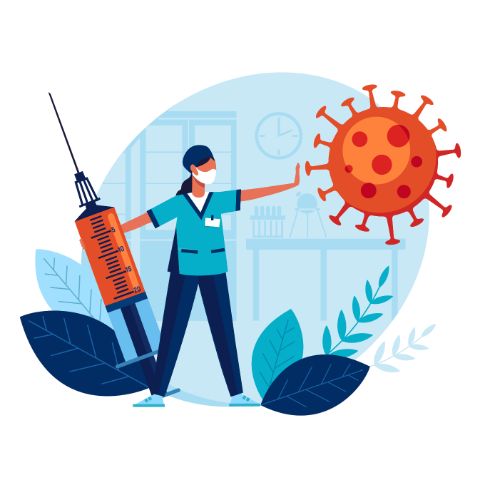Omicron –All You Need to Know About the Latest COVID-19 Variant
Omicron –All You Need to Know About the Latest COVID-19 Variant
Published on January 17, 2022. EST READ TIME: 3 minutes

Just when the whole world was getting vaccinated and hoping that COVID-19 would soon become history, a new variant of the virus reared its scary head – Omicron. Unlike the severe Delta variant, which caused widespread hospitalisation, severe respiratory issues and a clamour for respirators, oxygen cylinders and ventilators, Omicron seems to be much less severe for the time being. However, it poses a big risk for unvaccinated individuals, and more so because the infection and transmission rates are high. Which is why, getting vaccinated at the earliest is essential. And you need a health insurance plan too, so that your finances don’t get drained in case of a medical emergency.
Omicron is less likely to cause classic COVID symptoms
COVID-19 has manifested itself in 3 distinct waves. The third of which is the latest, Omicron. The Delta variant caused the notorious second wave of COVID in the country and caused millions of infections and thousands of deaths. Delta seemed to attack the respiratory system, especially the lungs, and caused extreme breathlessness. The Omicron variant was first discovered in South Africa, somewhere during October-November of 2021. What’s surprising about this specific variant is the rapid transmission and high infectiousness of the same. Omicron seems to affect even those who are completely vaccinated. What’s even more surprising is that Omicron doesn’t seem to mimic the classic COVID symptoms observed in Delta and the first wave of the pandemic. It is easy to be deceived by claims that this variant of the virus is ‘milder’ than previous strains.
Symptoms of Omicron are more akin to the common cold
While the dreaded Delta variant showed severe life-threatening symptoms such as breathlessness and a steep drop in blood-oxygen levels, Omicron’s symptoms closely resemble common cold. Some of the symptoms are:
1. Soreness in throat:
Omicron may not lead to breathlessness. According to sources at AIIMS, Delhi, Omicron seems to proliferate in the throat. This explains why a sore throat is one of the major symptoms of the new strain. The effect on the lungs seems minimal though.
2. Fatigue:
Most of us feel fatigued at some point or the other. We most often pass this off as the result of a hard day or incomplete sleep. Omicron is said to cause fatigue, and hence, this is considered as a credible symptom. So, if you’re feeling uncharacteristically tired or disoriented, do not attribute this to general fatigue and see your physician immediately.
3. Fever and body aches:
Omicron seems to share a number of symptoms with common cold and influenza. A fever, be it a low grade one or a high fever, is another symptom of the virus. Body ache, which is also another symptom of the flu, is said to be a common symptom of Omicron.
What to do next?
While it remains to be seen how this wave plays out, the public at large needs to be vigilant and follow COVID-19 protocols.
• If you have any of the symptoms, the first thing to do is get a RT-PCR test done. Till the reports come out, you should try and stay in isolation to curb the spread of the virus.
• The Omicron variant is said to be mild. But this doesn’t mean you can take it casually. Continue to follow COVID protocols, such as avoiding crowded areas and travel, unless unavoidable. Maintain a safe distance in public places, wash hands regularly or use a hand sanitiser as often as possible.
• While mild infections seem to be on the rise, severe infections are a distinct possibility, as the situation evolves.
• Unvaccinated individuals are at the highest risk of severe infection. If you or any one of your family members is unvaccinated, it is highly recommended that you take the vaccine at the earliest.
Conclusion
Being vigilant and taking care of the symptoms, andfollowing COVID-19 isolation and safety protocols are the only ways of fighting this latest variant of the disease. If you’re unvaccinated, it is a good idea to get yourself inoculated. Keeping your health insurance plan up to date and making sure it offers enough coverage is important as well.
Disclaimer: The above information is for illustrative purpose only. For more details, please refer to policy wordings and prospectus before concluding the sales.
RELATED ARTICLES
Safety Measures to follow if someone Tests COVID Positive
Why should you buy a COVID-19 Specific health insurance plan ?
Understanding the difference between isolation and quarantine










 Health Insurance
Health Insurance  Travel Insurance
Travel Insurance  Car Insurance
Car Insurance  Cyber Insurance
Cyber Insurance  Critical Illness Insurance
Critical Illness Insurance
 Pet Insurance
Pet Insurance
 Bike/Two Wheeler Insurance
Bike/Two Wheeler Insurance  Home Insurance
Home Insurance  Third Party Vehicle Ins.
Third Party Vehicle Ins.  Tractor Insurance
Tractor Insurance  Goods Carrying Vehicle Ins.
Goods Carrying Vehicle Ins.  Passenger Carrying Vehicle Ins.
Passenger Carrying Vehicle Ins.  Compulsory Personal Accident Insurance
Compulsory Personal Accident Insurance  Travel Insurance
Travel Insurance  Rural
Rural 











